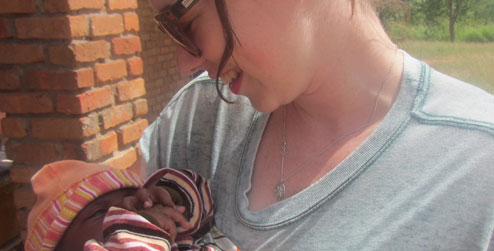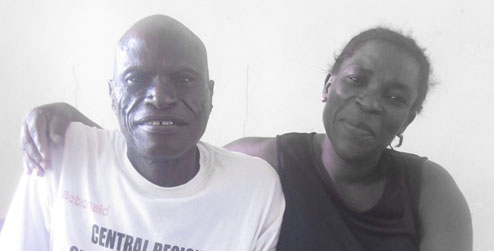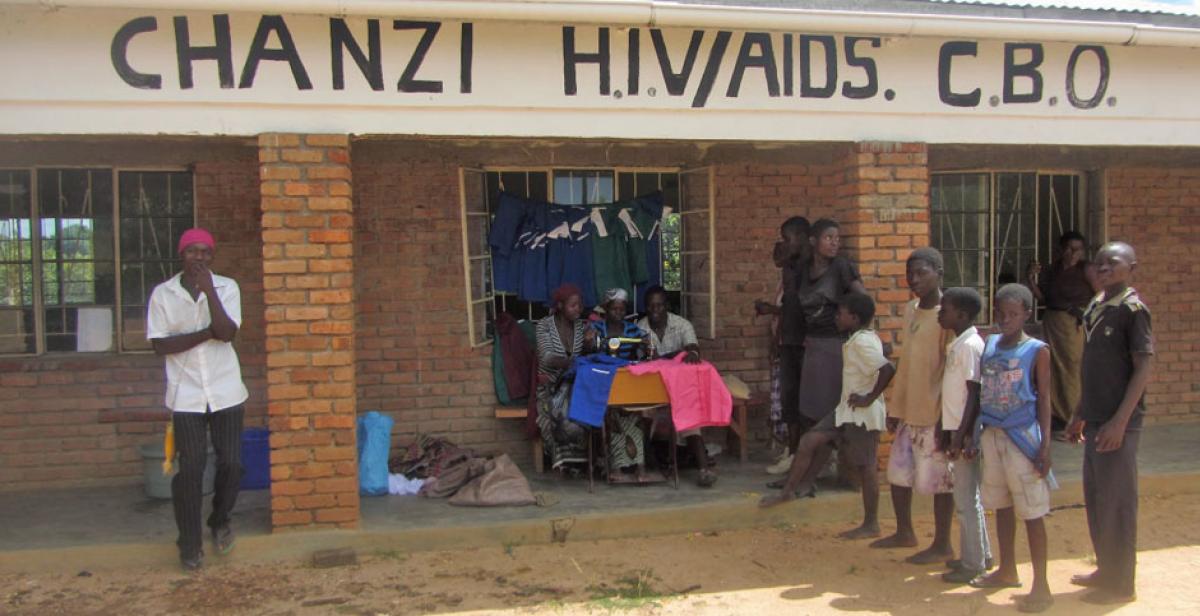Tuesday had finally arrived; a concoction of excitement and nerves began to swirl around in my tummy as we strolled along the humid streets of Nkhotakota in the early morning hustle and bustle. Our destination was Chanzi support group. This is where our partner organisation, COWLHA (Coalition of Women Living with HIV and AIDS), hold their meetings and today we were going to join them for the first time.
As we made our way up the rocky dirt path steering us closer to the building, I really didn’t know what to expect. In all honesty I half expected to find a small gathering of frail women weakened by their illness, but what greeted us was the complete opposite. I was grinning from ear to ear as women came charging towards us, arms fully stretched and ready to embrace us with some of the tightest hugs I have ever received. Once released from their warming grip I looked around at my surroundings and couldn’t help but smile. There was a huge group of extremely energetic, bare footed women sprinting around playing netball, another little crowd having a morning natter session, a bunch of youths having a game of footy inside the centre and an adorable two month old baby boy snuggled up in his mother’s arms sucking on two tiny fingers. I instantly felt at ease and eager to meet everyone.

The support group was now in session. We did a quick loop around the circle introducing ourselves and then jumped to our feet as the women began to sing. The song was so infectious - you couldn’t resist clapping and stomping your feet, and a lot of booty shaking was a must! Those women were throwing around all kinds of shapes! It was certainly a great way to get started.
Once the songs had finished we played a quick game of “Islands”, which is a game I learnt from my time working as a children’s rep. The women grasped it very well and soon enough their competitive streaks revealed themselves! We then split the women into two teams for a debate activity. The debate question was:
“You are HIV positive and you have just had a healthy baby at the hospital. The doctors have explained to you in a rude manner that you should not have any more children and that this will be your last”.
Both sides - for and against - came up with some really brilliant points. The team which took the doctor’s side argued that pregnant women with HIV are more susceptible to death during labour due to their immune systems being much weaker. The group which were against argued back that it is their right to have as many children as they want. They then pointed to the two month old baby nestled in his mother’s arms and explained that he is living proof that even an HIV positive mother, with the right medication and advice, can give birth to a very healthy HIV negative baby. The Malawian volunteers in our group did a great job translating what the women were discussing so that the UK volunteers could follow. I was very engrossed in their debate.
Then onto the next activity! We also brought two balls along with us to the session and had taped two questions onto each ball so that we could throw them around the group for the women to answer. I was very excited to carry out this particular activity, especially because it was going to be the first time I’d hear the women openly talking about their experiences and challenges that they have faced. Here are a few of my favourite responses:
“What are your dreams and plans for the future?”
The answers we received for this question were particularly inspirational. Each woman who answered explained that they wanted to open their own businesses. Whether it was to sell fish and vegetables, farm goats or open a sewing shop, all of the women expressed a lot of ambition. The women went on to explain to us that the head chiefs within their villages often don’t like them to, or won’t let them, work. The chiefs label them as “the walking dead”. If you ask me, from what I have heard and seen so far, these women definitely wouldn’t go down without a fight! COWLHA are also addressing this issue, and are providing Chief training, so that they have a better understanding of the illness and to reduce discrimination.
“What has been your biggest challenge, and how did you overcome it?”
Surprisingly a lot of the answers to this question revolved around the doctors and nurses working in the hospitals. The women explained that they had been shunned by them, refused help and generally treated in a poor manner. It was to my delight when they went on to explain how COWLHA supported them and were helping to resolve this issue. Through contacting the police and setting up meetings with health care works, COWLHA’s hope is that this situation will start to improve.
COWLHA really has helped these women in such a positive and productive way. One woman told us that when she found out that she was HIV positive, her family refused to share food or eat with her because they feared contracting it themselves. COWLHA went to speak to this family and to help educate them on HIV and explain that they shouldn’t give in to stigma, because what it often portrays about people living with HIV is immensely wrong. Again, yet another issue COWLHA has resolved.
Wow, so much to write about, and that was only our first session! I’ve really grown so much already from my experience working alongside COWLHA. Watch this space, there is so much more to come!
Debbie out x

Week One - First Blog
Location: Nkhotakota
By UK volunteer Debbie Burns, Team Umodzi (United)



